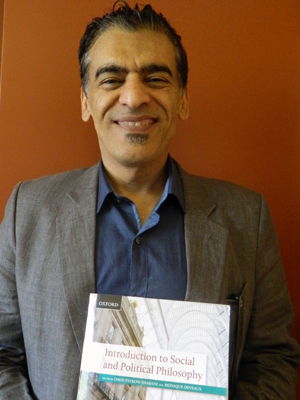
Following failed attempts to charge members of a polygamist Mormon community in Bountiful, B.C., the Supreme Court of British Columbia initiated a challenge against polygamy in 2011. The court’s decision ultimately upheld anti-polygamy laws.
Was that decision the right one? What would philosophers of the past say about this and other issues facing Canadian society today?
Philosophy professor Omid Payrow Shabani uses polygamy laws as one of many case studies in his new book, Introduction to Social and Political Philosophy: Texts and Cases (co-edited with colleague and philosophy professor Monique Deveaux), and matches it with text from 19th-century philosopher John Stuart Mill.
Payrow Shabani suggests Mill’s writings provide a new way for readers to look at the polygamy question, and considering the ramifications of polygamy laws, can help philosophy students better understand Mill’s work.
For example, Payrow Shabani writes that Mill “states that insofar as the individual’s action does not pose any threat to the public or harm anyone else, the state should not interfere. The domain of human liberties, according to Mill, must include certain basic and practical liberties such as freedom of conscience, freedom of association, freedom of choice and the pursuit of one’s happiness.”
Using readings from Mill’s work, Payrow Shabani then turns to the Supreme Court case about polygamy. He writes: “Among the evidence considered was expert testimony attesting to the incompatibility of plural marriage with Canada’s commitments…to sexual equality and to the rights and welfare of children. The Court also heard from women who had formerly been wives in polygamous Mormon marriages who…presented candid testimony of the harms that they experienced in these arrangements.”
He adds that despite the court’s reliance on evidence of harm, it is “by no means certain that Mill would support criminalization of the practice. Ultimately he worried more about the use of state apparatus to enforce society’s norms in cases lacking clear evidence of harm to others.”
Payrow Shabani has taught an introductory course on socio-political philosophy at U of G since 2003, and found that many students struggled with canonical texts because the context was so foreign to their own experiences. He thought that if these classical pieces of writing and thought could be connected to contemporary issues, it would bridge the gap for students.
In particular, he wanted to use Canadian cases and news items because his students would be able to relate to them. He also wanted to show that you don’t need to look far to find real-world applications for philosophy.
The book took three years to write, and for the last two Payrow Shabani worked with Deveaux as co-editor. “It really was too big a project for one person,” he says.
In addition to polygamy in Canada, the authors looked at a variety of controversial and intriguing topics, such as Sharia Law in Ontario, Quebec’s consideration of separation from Canada, the future of the Senate, universal health care and First Nations children in the care of child welfare.
While Payrow Shabani’s first goal is to help students gain a deeper understanding of philosophical foundations, he also wants to encourage students to incorporate the ideas of philosophers into their own views of current issues and events. “I hope they will become active participants in politics and influence political actions and be able to use the insights they gain through these studies.
“It surprised me in working on this how often major issues in society reoccur: How do we create a just society? What are the barriers of freedom? How do we maintain peace in a diverse society? People deal with these issues in different ways at different points in time, and the philosophers have a lot to teach us so that we are not starting from scratch every time we face a challenge.”